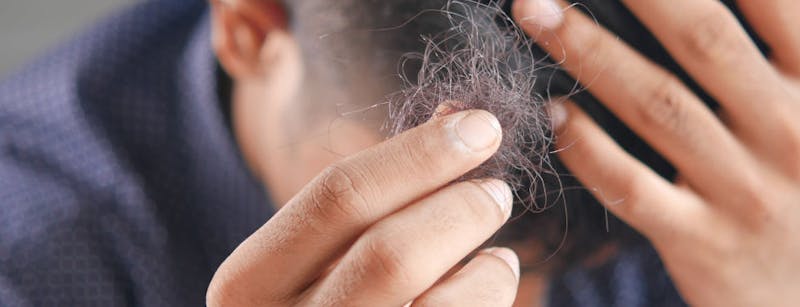Losing your hair can be frustrating and embarrassing. While companies love to sell products that supposedly address this issue, your best bet is to find the root cause and then address it from there.
Possible reasons for hair loss
- Genetics: There appears to be a genetic component in both male-patterned hair loss and female patterned hair loss, although it is not well-understood (1). However, if family members have experienced this, don’t despair as there are a lot of factors withing your control.
- Nutrient deficiencies: The body needs adequate resources to produce healthy hair. Since your body’s main goal is survival, it will shuttle nutrients toward life-sustaining organs and systems before it uses them to create hair. Vitamins A, C, D, E and B vitamins are all necessary to produce healthy hair, as are the minerals iron, selenium, and zinc (2).
- Heavy metal toxicity: Mercury (3), lead, and other heavy metals can lead to hair loss. If you want to find out if you have heavy metal toxicity, your practitioner can order a simple urine test for you. If you do indeed have one or more of these heavy metals at a toxic level in your body, you will want to enlist the help of your practitioner to detox these metals from your system safely.
- Hormonal imbalance: Modern life leads to hormonal dysregulation for many men and women. The most potent androgen hormone, dihydrotestosterone (DHT), actually regulates hair loss. To find out if this is the cause (or a contributing cause) of your hair loss, ask your functional practitioner to run a hormone panel for you. These are simple tests that can be sone with saliva or urine and the information gleaned can be life-changing for some. It is most often thought of in relation to hair loss for men, but it can play a role in female hair loss as well.
- Iron: Iron deserves special attention when it comes to hair loss. A deficiency is a well-known cause of hair loss and thinning. Serum ferritin measures the amount of stored iron in your blood and when this gets below 70 mcg/L, hair loss occurs. In fact, hair loss will not stop until the level goes above 70 mcg/L. Also, low iron tells your thyroid to conserve energy. The body decreases thyroid production as a result which can also cause hair loss as seen below.
- Thyroid imbalance: When the thyroid hormones are out of balance causing the thyroid to under-function (hypothyroid) or over-function (hyperthyroid), hair loss can occur.
What is the Thyroid Gland?
The thyroid gland that controls how the body uses oxygen and energy. To do this, it makes thyroid hormones: thyroxine (T4) and triiodothyronine (T3). In order to create these hormones, the thyroid needs the mineral iodine and the amino acid tyrosine. Selenium and magnesium are important to this process as well.
In order for the body to be able to use these thyroid hormones, they have to be converted from inactive to active. 20% of this conversion is done in the GI tract and another 20% is done in other body tissues. A whopping 60% of conversion is done in the liver! Inflammation, stress, diabetes, and an acute injury can all interfere with thyroid hormone conversion.
My thyroid is too slow, and I am losing my hair!
Since the thyroid controls the rate at which the body uses oxygen and energy, this can affect hair and nail growth. What happens is that hair that should be in the growing phase (anagen) get pushed to the next phase which is resting and shedding (telogen) to conserve energy.
My thyroid is too fast, and I am losing my hair!
Although on the surface, a hyperthyroid seems to be the opposite problem of hypothyroid, both are disorders of thyroid dysregulation. Therefore, what applies above to hypothyroid, applies here as well. The hair is not spending the appropriate time in the growing phase and is instead moving ahead to the resting a shedding phase.
What lab tests do I need to find out if I have a thyroid problem?
To find out whether a thyroid problem is the cause of your hair loss (or a contributing cause), ask your doctor to run a full thyroid panel. Be sure to specify that you want a full thyroid panel because many conventional doctors will only one run biomarker for thyroid: TSH. This marker alone, unfortunately, isn’t enough to detect the majority of thyroid dysfunction. Many people have lab normal TSH, but they are experiencing thyroid symptoms and a full thyroid panel reveals the imbalance. A full thyroid panel is TSH, Reverse T3, Total T3, Free T3, Total T4, Free T4, and T3 Uptake.
Another important consideration is lab ranges for “normal”. A functional or integrative practitioner has a much tighter range that they consider acceptable for optimal health. The lab ranges that a traditional doctor uses include unhealthy people!
Natural Strategies to Balance the Thyroid
- Eat a diet containing plenty of the four crucial minerals: iodine, selenium, magnesium, and zinc. Supplement with one or more of these if you and your practitioner suspect a deficiency.
- Eat high quality protein: Make sure you are getting your tyrosine. This amino acid is found in wild-caught salmon, grass-fed steak, pastured pork, and lentils.
- Clean house: Get rid of the endocrine disruptors such as plastics and synthetic fragrance. Eat organic vegetables.
- Support your liver: 60% of thyroid hormone conversion occurs in the liver. Support it by eating leafy greens, grass-fed liver, and/or taking milk thistle or dandelion to help with detox.
- Eliminate food sensitivities: Food sensitivities cause chronic inflammation. Chronic inflammation in turn causes hormonal imbalances, insulin resistance (think belly fat), fluid retention, and it interferes with your digestion.
- Sleep: Sleep is not only important for taking care of your hypothalamus-pituitary-adrenal (HPA) axis as listed above, but also for detoxing. Your liver goes through a cleansing of sort between 1 and 3 am. If you are not sleeping at that time, you are making your liver work harder. Since it already has so many important jobs, this can overburden it quickly.
- Undergo a detox program while under the care of a practitioner: Rid your body of toxic heavy metals, pesticides and other endocrine disruptors. A word of caution though: Detoxing can be dangerous if done improperly. Enlist the help of a professional to make sure you are doing it safely.
Natural Strategies to Stimulate Hair Growth
- Horsetail: Taking horsetail tincture or capsules can help with hair growth because it contains all of the minerals needed to grow healthy hair.
- Eat foods with Silica: This is an important mineral for hair growth and strength. You can supplement with it or make sure to eat plenty of foods containing it. Seafoods generally contain silica as do bananas and spinach.
- Iron: Since ferritin levels are crucial to hair growth, eat plenty of iron containing foods like grass-fed beef liver, pastured meats, and spirulina. Also, having vitamin c rich foods with your iron containing foods helps with absorptions. You can also supplement with iron until you are sufficient.
- Selenium: Another important mineral for the hair and the thyroid. Some selenium-rich foods are mushrooms, Brazil nuts, turkey, eggs, and halibut.
- L-lysine: Taking 1,000 mg of lysine daily has been shown to improve hair growth. This also helps with immunity! Beef, chicken, pork, and milk are all high in lysine.
Wash less frequently and avoid ponytails: Excess pulling and tugging will cause the “resting” hair to shed faster.
- Balance reproductive hormones: You saw above that your thyroid hormones need to be in balance for your hair to start growing again and the same is true for reproductive hormones. Get a hormone test done so your practitioner can create a hormone balancing protocol for you with diet and supplements.
https://pubmed.ncbi.nlm.nih.gov/26375223/
https://www.ncbi.nlm.nih.gov/pmc/articles/PMC6380979/
https://pubmed.ncbi.nlm.nih.gov/30939539/

